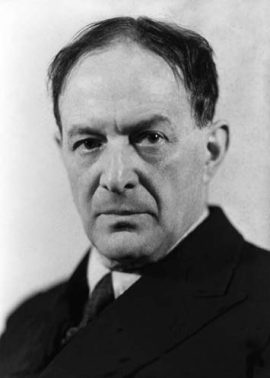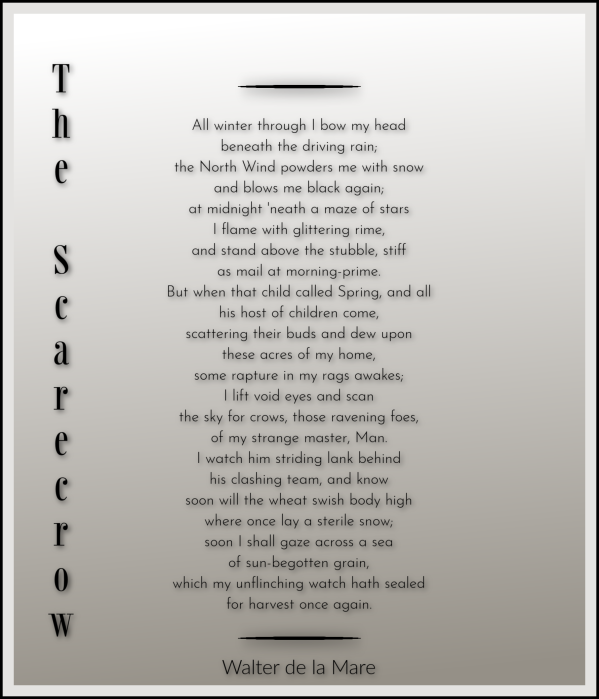
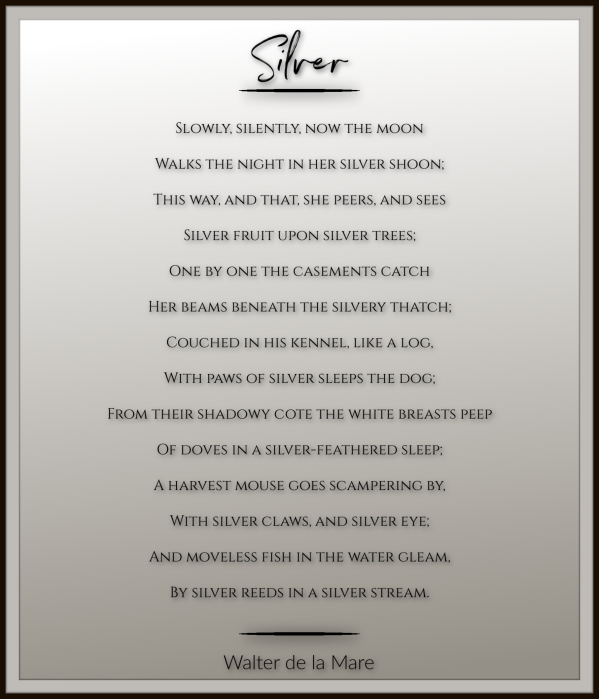
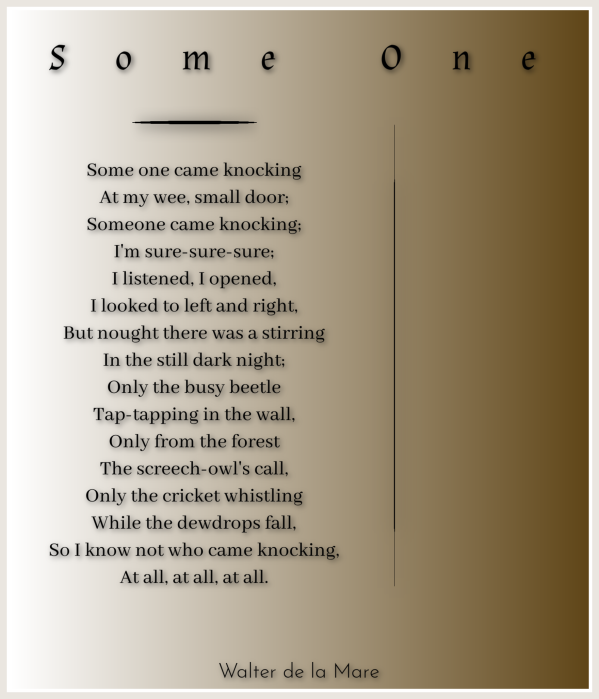
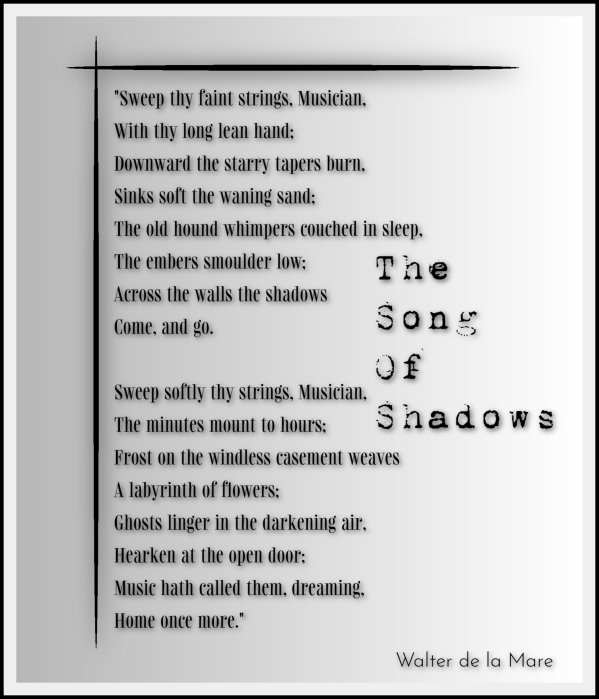
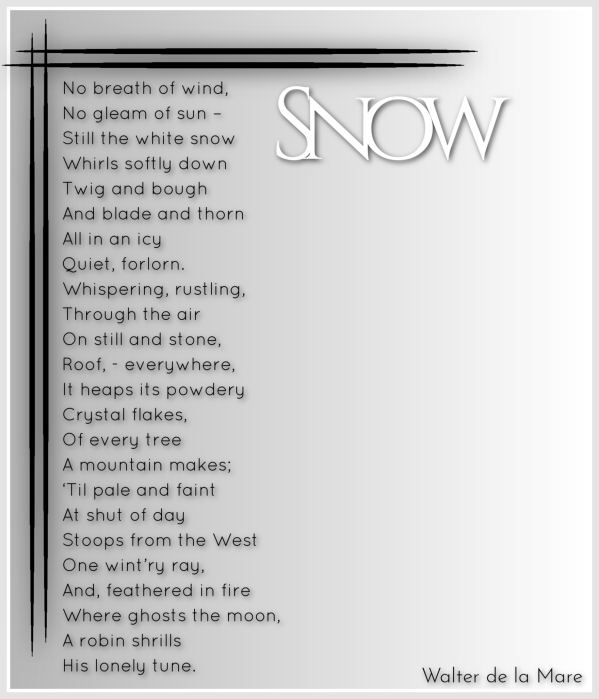
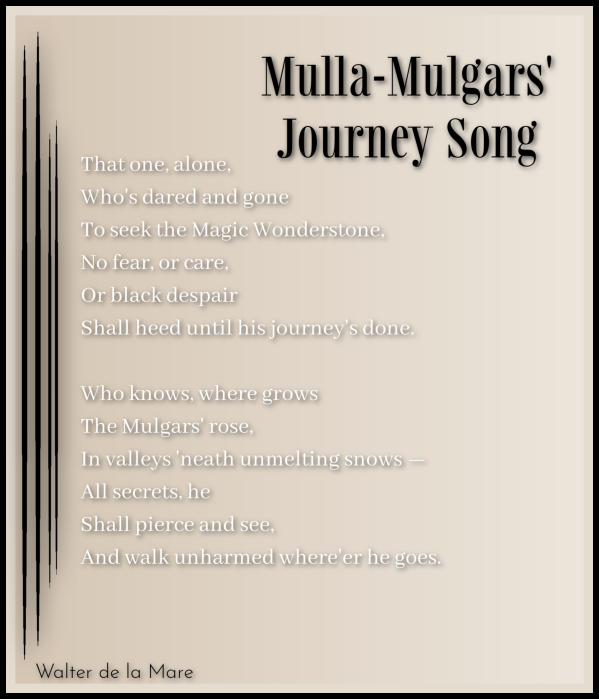
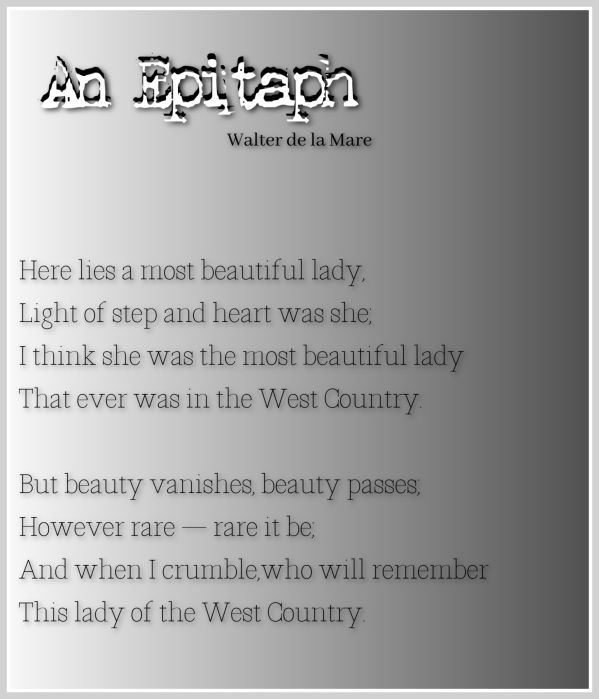
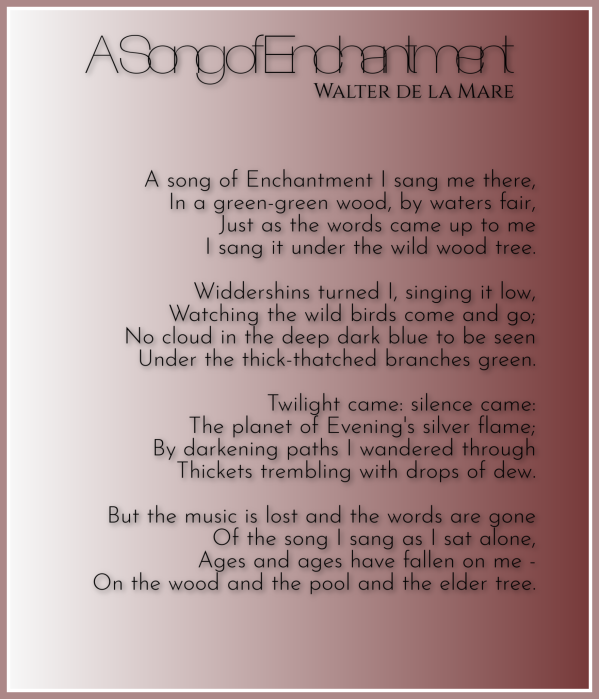
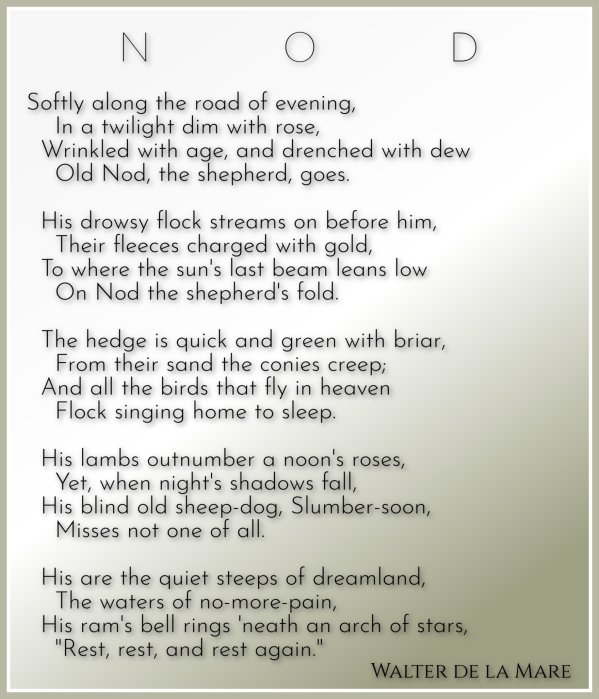
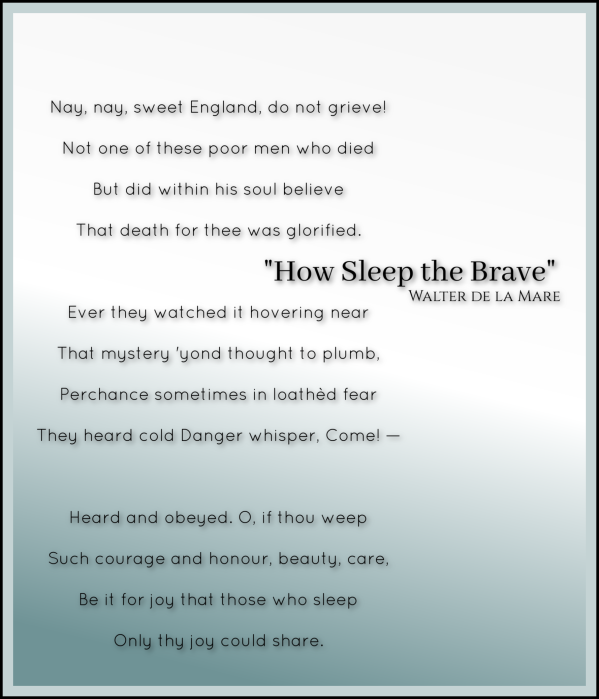
John Mouldy
I spied John Mouldy in his celler,
Deep down twenty steps of stone;
In the dusk he sat a-smiling
Smiling there all alone.
He read no book, he snuffed no candle;
The rats ran in, the rats ran out,
And far and near, the drip of water
Went whisp'ring about.
The dusk was still, with dew a-falling,
I saw the Dog-star bleak and grim,
I saw a slim brown rat of Norway
Creep over him.
I spied John Mouldy in his celler,
Deep down twenty steps of stone;
In the dusk he sat a-smiling
Smiling there all alone.
Arabia
Far are the shades of Arabia,
Where the Princes ride at noon,
'Mid the verdurous vales and thickets,
Under the ghost of the moon;
And so dark is that vaulted purple
Flowers in the forest rise
And toss into blossom 'gainst the phantom stars
Pale in the noonday skies.
Sweet is the music of Arabia
In my heart, when out of dreams
I still in the thin clear mirk of dawn
Descry her gliding streams;
Hear her strange lutes on the green banks
Ring loud with the grief and delight
Of the dim-silked, dark-haired Musicians
In the brooding silence of night.
They haunt me — her lutes and her forests;
No beauty on earth I see
But shadowed with that dream recalls
Her loveliness to me:
Still eyes look coldly upon me,
Cold voices whisper and say —
'He is crazed with the spell of far Arabia,
They have stolen his wits away.'
Old Susan
When Susan's work was done, she'd sit
With one fat guttering candle lit,
And window opened wide to win
The sweet night air to enter in;
There, with a thumb to keep her place
She'd read, with stern and wrinkled face.
Her mild eyes gliding very slow
Across the letters to and fro,
While wagged the guttering candle flame
In the wind that through the window came.
And sometimes in the silence she
Would mumble a sentence audibly,
Or shake her head as if to say,
"You silly souls, to act this way!"
And never a sound from night I'd hear,
Unless some far-off cock crowed clear;
Or her old shuffling thumb should turn
Another page; and rapt and stern,
Through her great glasses bent on me,
She'd glance into reality;
And shake her round old silvery head,
With—"You!—I thought you was in bed!"—
Only to tilt her book again,
And rooted in Romance remain.
Fare Well
When I lie where shades of darkness
Shall no more assail mine eyes,
Nor the rain make lamentation
When the wind sighs;
How will fare the world whose wonder
Was the very proof of me?
Memory fades, must the remembered
Perishing be?
Oh, when this my dust surrenders
Hand, foot, lip, to dust again,
May these loved and loving faces
Please other men!
May the rusting harvest hedgerow
Still the Traveller's Joy entwine,
And as happy children gather
Posies once mine.
Look thy last on all things lovely,
Every hour. Let no night
Seal thy sense in deathly slumber
Till to delight
Thou have paid thy utmost blessing;
Since that all things thou wouldst praise
Beauty took from those who loved them
In other days.
Mistletoe
Sitting under the mistletoe
(Pale-green, fairy mistletoe),
One last candle burning low,
All the sleepy dancers gone,
Just one candle burning on,
Shadows lurking everywhere:
Some one came, and kissed me there.
Tired I was; my head would go
Nodding under the mistletoe
(Pale-green, fairy mistletoe),
No footsteps came, no voice, but only,
Just as I sat there, sleepy, lonely,
Stooped in the still and shadowy air
Lips unseen - and kissed me there.
Music
When music sounds, gone is the earth I know,
And all her lovely things even lovelier grow;
Her flowers in vision flame, her forest trees
Lift burdened branches, stilled with ecstasies.
When music sounds, out of the water rise
Naiads whose beauty dims my waking eyes,
Rapt in strange dreams burns each enchanted face,
With solemn echoing stirs their dwelling-place.
When music sounds, all that I was I am
Ere to this haunt of brooding dust I came;
And from Time's woods break into distant song
The swift-winged hours, as I hasten along.
Winter
Clouded with snow
The cold winds blow,
And shrill on leafless bough
The robin with its burning breast
Alone sings now.
The rayless sun,
Day's journey done,
Sheds its last ebbing light
On fields in leagues of beauty spread
Unearthly white.
Thick draws the dark,
And spark by spark,
The frost-fires kindle, and soon
Over that sea of frozen foam
Floats the white moon.
Comfort
As I mused by the hearthside,
Puss said to me;
"there burns the fire , man,
and here sit we.
Four walls around us
against the cold air;
and the latch drawn close
to the draughty stair.
A roof o'er our heads
star-proof, moon immune,
and a wind in the chimney
to wail us a tune."
"What felicity!" miaowed he,
"where none may intrude;
just man and beast- met
in this solitude!"
"Dear God, what security,
comfort and bliss!
and to think, too what ages
have brought us to this!"
"You in your sheep's' wool coat,
buttons of bone,
and me in my fur-about
on the warm hearthstone"
At Ease
Most wounds can Time repair;
But some are mortal — these:
For a broken heart there is no balm,
No cure for a heart at ease —
At ease, but cold as stone,
Though the intellect spin on,
And the feat and practiced face may show
Nought of the life that is gone;
But smiles, as by habit taught;
And sighs, as by custom led;
And the soul within is safe from damnation,
Since it is dead.
Bones
Said Mr. Smith, “I really cannot
Tell you, Dr. Jones—
The most peculiar pain I’m in—
I think it’s in my bones.”
Said Dr. Jones, “Oh, Mr. Smith,
That’s nothing. Without doubt
We have a simple cure for that;
It is to take them out.”
He laid forthwith poor Mr. Smith
Close-clamped upon the table,
And, cold as stone, took out his bones
As fast as he was able.
Smith said, “Thank you, thank you, thank you,”
And wished him a good-day;
And with his parcel ‘neath his arm
He slowly moved away.
Good-bye
The last of last words spoken is, Good-bye -
The last dismantled flower in the weed-grown hedge,
The last thin rumour of a feeble bell far ringing,
The last blind rat to spurn the mildewed rye.
A hardening darkness glasses the haunted eye,
Shines into nothing the watcher's burnt-out candle,
Wreathes into scentless nothing the wasting incense,
Faints in the outer silence the hunting-cry.
Love of its muted music breathes no sigh,
Thought in her ivory tower gropes in her spinning,
Toss on in vain the whispering trees of Eden,
Last of all last words spoken is, Good-bye.
Why?
Ever, ever
Stir and shiver
The reeds and rushes
By the river:
Ever, ever,
As if in dream,
The lone moon's silver
Sleeks the stream.
What old sorrow,
What lost love,
Moon, reeds, rushes,
Dream you of?
All That's Past
Very old are the woods;
And the buds that break
Out of the brier's boughs,
When March winds wake,
So old with their beauty are—
Oh, no man knows
Through what wild centuries
Roves back the rose.
Very old are the brooks;
And the rills that rise
Where snow sleeps cold beneath
The azure skies
Sing such a history
Of come and gone,
Their every drop is as wise
As Solomon.
Very old are we men;
Our dreams are tales
Told in dim Eden
By Eve's nightingales;
We wake and whisper awhile,
But, the day gone by,
Silence and sleep like fields
Of amaranth lie.
Alone
The abode of the nightingale is bare,
Flowered frost congeals in the gelid air,
The fox howls from his frozen lair:
Alas, my loved one is gone,
I am alone:
It is winter.
Once the pink cast a winy smell,
The wild bee hung in the hyacinth bell,
Light in effulgence of beauty fell:
I am alone:
It is winter.
My candle a silent fire doth shed,
Starry Orion hunts o'erhead;
Come moth, come shadow, the world is dead:
Alas, my loved one is gone,
I am alone;
It is winter.
The Keys of Morning
While at her bedroom window once,
Learning her task for school,
Little Louisa lonely sat
In the morning clear and cool,
She slanted her small bead-brown eyes
Across the empty street,
And saw Death softly watching her
In the sunshine pale and sweet.
His was a long lean sallow face;
He sat with half-shut eyes,
Like a old sailor in a ship
Becalmed 'neath tropic skies.
Beside him in the dust he had set
His staff and shady hat;
These, peeping small, Louisa saw
Quite clearly where she sat -
The thinness of his coal-black locks,
His hands so long and lean
They scarcely seemed to grasp at all
The keys that hung between:
Both were of gold, but one was small,
And with this last did he
Wag in the air, as if to say,
"Come hither, child, to me!"
Louisa laid her lesson book
On the cold window-sill;
And in the sleepy sunshine house
Went softly down, until
She stood in the half-opened door,
And peeped. But strange to say
Where Death just now had sunning sat
Only a shadow lay:
Just the tall chimney's round-topped cowl,
And the small sun behind,
Had with its shadow in the dust
Called sleepy Death to mind.
But most she thought how strange it was
Two keys that he should bear,
And that, when beckoning, he should wag
The littlest in the air.
November
There is wind where the rose was,
Cold rain where sweet grass was,
And clouds like sheep
Stream o'er the steep
Grey skies where the lark was.
Nought warm where your hand was,
Nought gold where your hair was,
But phantom, forlorn,
Beneath the thorn,
Your ghost where your face was.
Cold wind where your voice was,
Tears, tears where my heart was,
And ever with me,
Child, ever with me,
Silence where hope was.
|
|
